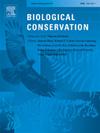生态系统服务概念和术语的使用和滥用
IF 4.4
1区 环境科学与生态学
Q1 BIODIVERSITY CONSERVATION
引用次数: 0
摘要
生态学和自然保护中使用的语言塑造了我们对自然世界的理解和行动。在最常用的术语中,“生态系统服务”已经成为保护话语的核心,定义为人类从生态系统中获得的利益。虽然“生态系统服务”框架有效地传达了自然对人类福祉的贡献,但其以人类为中心的关注点引发了对概念准确性和伦理影响的担忧。由于优先考虑人类的效用,这一术语有可能歪曲生态角色,使没有直接经济价值的物种和生态系统的保护工作边缘化。此外,它在研究和政策中的误用导致了混淆,将生态过程与以人为中心的利益混为一谈。尽管自然对人类的贡献(NCP)已经被提出作为解决这些问题的替代框架,但它面临着类似的局限性。我们主张更广泛地采用现有的“生态系统功能”框架,而不是用另一个人类中心框架取代一个人类中心框架。这种方法提供了更准确的生态过程描述,同时避免了减少生态系统以造福人类的概念和伦理陷阱。因此,“生态系统功能”框架向更加全面和包容的方法迈出了一步,这种方法尊重生态关系的复杂性,并支持有效的保护措施。本文章由计算机程序翻译,如有差异,请以英文原文为准。
The use and abuse of ecosystem service concepts and terms
The language used in ecology and conservation shapes our understanding of and actions toward the natural world. Among the most commonly used terms, ‘ecosystem services’ has become central to conservation discourse, defined as the benefits humans derive from ecosystems. While the ‘ecosystem services’ framework has effectively communicated nature's contributions to human well-being, its anthropocentric focus raises concerns about conceptual accuracy and ethical implications. By prioritizing human utility, the term risks misrepresenting ecological roles and marginalizing conservation efforts for species and ecosystems without immediate economic value. Additionally, its misuse in research and policy has led to confusion by conflating ecological processes with human-centered benefits. Although Nature's Contributions to People (NCP) has been proposed as an alternative framework to address these concerns, it faces similar limitations. Rather than replacing one anthropocentric framework with another, we argue for a broader adoption of the already existing ‘ecosystem functions’ framework. This approach provides a more accurate descriptor of ecological processes while avoiding the conceptual and ethical pitfalls of reducing ecosystems to their benefits for humans. Thus, the ‘ecosystem functions’ framework offers a step toward a more holistic and inclusive approach that respects the complexity of ecological relationships and supports effective conservation practices.
求助全文
通过发布文献求助,成功后即可免费获取论文全文。
去求助
来源期刊

Biological Conservation
环境科学-环境科学
CiteScore
10.20
自引率
3.40%
发文量
295
审稿时长
61 days
期刊介绍:
Biological Conservation is an international leading journal in the discipline of conservation biology. The journal publishes articles spanning a diverse range of fields that contribute to the biological, sociological, and economic dimensions of conservation and natural resource management. The primary aim of Biological Conservation is the publication of high-quality papers that advance the science and practice of conservation, or which demonstrate the application of conservation principles for natural resource management and policy. Therefore it will be of interest to a broad international readership.
 求助内容:
求助内容: 应助结果提醒方式:
应助结果提醒方式:


